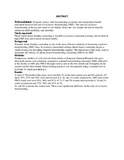| dc.identifier.citation | Kihara, Ruth Wanjiru., Wamalwa, Dalton., Nduati, Ruth., Musoke, Rachel., Mwaura, Peter., Ndinda, Jedida(2014). Efficacy of phone based counselling in supporting primi-parous women to exclusively breastfeed. Amref Health Africa International Conference. November 24 - 26, 2014 Nairobi, Kenya. (Book of Abstracts, P.89) | en_US |
| dc.description.abstract | www.ahaic.org
89
Amref Health Africa International Conference
Book of Abstracts
November 24 - 26, 2014
Nairobi, Kenya
acid supplements (IFA), among others. The proportion of women who had attended 4 ANC visits during pregnancy
was 4.8% in Ethiopia, 43% in Kenya, and 14% in Senegal; about a fifth in Ethiopia and Kenya and 31.9% in Senegal
attended ANC in the first trimester. Only 3.4% of women in Ethiopia, 36.7% in Kenya and 52.6% in Senegal had taken
≥90 IFA tablets during pregnancy. Qualitative data found that knowledge and attitudes of women regarding care
seeking for ANC and benefits of IFA during pregnancy period was low.
Conclusion:
In all 3 countries, but particularly Ethiopia, health and nutrition services for pregnant women and
newborns are under-provided and under-utilized. This evaluation revealed both demand and supply side barriers
that are now being addressed as part of the on-going program.
TUAB007
Efficacy of phone based counselling in supporting primi-parous women to exclusively breastfeed.
Ruth Wanjiru Kihara (MBChB, MMED), Dalton Wamalwa
1
(MB, ChB, MMED, MPH), Ruth Nduati
1
(MBCHB, MMED, MPH),
Rachel Musoke
1
, (MBCHB, MMED, FABM), Christine Mwangi
2
, (BSc MSc ), Peter Mwaura (BSc, MSC
3
), Jedida Ndinda
2
1
Department of Pediatrics and Child Health, University of Nairobi),
2
KEMRI Centre for Public Health Research,
3
NARESA-K .
This study was done as a dissertation presented in part fulfillment of the requirements for the award of the master’s
degree in Paediatrics and Child Health, University of Nairobi by the first author.
Part of this work was funded by an award received by the third author from the International Christian Medical and
Dentist Association (ICMDA).
Corresponding author: Ruth W Kihara
Well established:
Frequent contact with breastfeeding counselor and standardized health education increases the
rate of exclusive breastfeeding (EBF). The rates of exclusive breastfeeding in Kenya and much of sub Sahara Africa are
low despite the known benefits of reduced child morbidity and mortality.
Newly expressed:
Phone based infant feeding counseling is feasible in resource constrained setting, and resulted in
high EBF rates and reduced neonatal deaths.
Background:
Frequent infant feeding counseling is one of the most effective methods of increasing exclusive
breastfeeding (EBF) rates. In resource constrained settings phone based counseling maybe a viable strategy
for
providing frequent
breastfeeding
support
. The objectives of this study were to determine the efficacy of phone-
based breastfeeding counseling (PBCS) for EBF.
Methods:
Primiparous mothers of well term newborn infants at Kenyatta National Hospital who gave informed
consent were randomly assigned to standard breastfeeding education (SBE) delivered at the facility or SBE plus PBCS
through weekly calls in the first month and fortnightly in the second and the third month. Infant feeding practices
was documented using a standard tool at 6,10 and 14 weeks
post delivery
.
Results:
A total of 180 mother-baby pairs were enrolled, 91 in the intervention arm and 89 controls. Of these 78%,
67% and 58% were interviewed at 6, 10, and 14 weeks respectively. EBF rates in the PBCS study arm were 93%, 90%
and 87%
of 71,57 and 50 women interviewed
at 6, 10 and 14 weeks postpartum and 72%, 58% and 45% in
70,
63, and 54 women
in the control arm.
There was
a significant difference
in the rates of exclusive breastfeeding | en_US |

